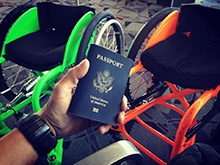Three decades of Accessible air travel for people with disabilities
By Brittany Ballenstedt
Paralyzed Veterans of America National Vice President Charles Brown remembers the moment his business travel was stalled due to a preventable error: his power wheelchair, on board a flight from Charlotte to Washington, D.C, had been dropped, bending the motor and transmission.
For Brown, a damaged wheelchair represents only one layer of a challenge that many people with disabilities face when embarking on air travel. Underlying that challenge is the personal implications it holds for people with disabilities who live active and independent lives. To Brown, a paralyzed Marine Corps veteran, a damaged wheelchair meant inconvenient travel to his hotel room, a day wasted on phone calls to have the wheelchair repaired and, perhaps most importantly, his absence at an important business meeting.
“The airline industry wonders why we want stronger legislation allowing us to sue for damages,” Brown writes in a post on AirAccess30.org, an online forum launched in January 2016 by Paralyzed Veterans of America. “I lost my golden opportunity for business in D.C. What is a lost day of work worth to them?”
Brown’s example is one of many voiced on AirAccess30.org calling for improved protections for passengers with disabilities embarking on air travel. As the nation celebrates the 30th anniversary of the 1986 Air Carrier Access Act (ACAA) – which introduced sweeping reforms in air travel for people with disabilities – on Oct. 2, 2016, it’s important to recognize that the spirit of the law has not been fully realized. Passengers with disabilities continue to encounter barriers such as damaged assistive devices, inaccessible lavatories and in-flight entertainment and delayed assistance.
“There’s a lot of discussion around increasing employment opportunities for people with disabilities,” said Heather Ansley, associate general counsel for corporate and government relations for Paralyzed Veterans of America. “But part of that means ensuring we have accessible air travel.”
Air travel access for people with disabilities has undergone dramatic improvements in the 30 years since passage of the ACAA. Airlines, for example, cannot refuse to transport anyone on the basis of disability for any reason except safety, nor can they require advanced notice for travelers with disabilities.
Yet the more than 40 stories shared on AirAccess30.org since January point to needed reforms in air travel access. Paralyzed Veterans of America continues to work with Congress to secure a robust package of amendments to improve air carrier access – including improved training for airline and assistance staff, increased enforcement of the protections available to travelers with disabilities under the ACAA through the Department of Justice, as well as a private right to action for passengers with disability-related complaints.
Recent victories championed by Paralyzed Veterans of America include the inclusion of two provisions that address a narrow scope of challenges faced by persons with disabilities in air travel. The Federal Aviation Administration Extension, Safety and Security Act of 2016 (Public Law 114-190) requires the Government Accountability Office to submit a report to Congress outlining each air carrier’s training policy for personnel and contractors regarding assistance for passengers with disabilities.
The FAA extension also requires the Department of Transportation to develop and disseminate best practices for air carriers to improve disability assistance training programs, and issue proposed regulations on including accessible lavatories on single-aisle aircraft, seating accommodations for persons with disabilities and definitions of the types of service animals that may accompany passengers with disabilities on board a flight.
This spring, DOT also outlined plans to create a negotiated rulemaking committee consisting of disability advocacy organizations like Paralyzed Veterans of America as well as airlines and aircraft manufacturers. The Accessible Air Transportation Advisory Committee, or ACCESS, is currently working to develop proposed amendments to DOT’s disability regulations on accessible in-flight entertainment and communications, accessible lavatories on single-aisle aircraft, and amending the definition of service animals.
“The ACAA has reached its 30th anniversary, and things are certainly better than they were, but we are still nowhere near where we want to be,” Ansley said. “For the future, we want to change that conversation so that all people with disabilities are offered seamless access to air travel.”
Moving forward, education is also a key component to fully recognizing and promoting protections for air travelers with disabilities, Ansley added. Many passengers with disabilities, for example, are not aware that the ACAA is separate from the 1990 Americans with Disabilities Act (ADA), and therefore may be less effective in advocating for needed changes in air travel access, Ansley said.
“If you don’t know what your rights are under the ACAA, you may not understand the responsibilities of airlines or the way you go about getting your needs met,” Ansley said. “We’re trying to figure out the best way for us to educate people with disabilities so they can be their own best advocates.”
Read more about the Air Carrier Access Act (ACAA)
Brittany Ballenstedt is a military spouse, freelance journalist and photographer in Washington, D.C



